| All Artists: Riccardo Chailly, Nelson Freire, Radio-Symphonie-Orchester Berlin Title: Rachmaninoff: Piano Concerto No. 3, Op. 30 / Suite No. 2 for two pianos Members Wishing: 0 Total Copies: 0 Label: Philips Release Date: 5/8/2001 Genre: Classical Styles: Forms & Genres, Concertos, Historical Periods, Classical (c.1770-1830) Number of Discs: 1 SwapaCD Credits: 1 UPC: 028946473221 |
Search - Riccardo Chailly, Nelson Freire, Radio-Symphonie-Orchester Berlin :: Rachmaninoff: Piano Concerto No. 3, Op. 30 / Suite No. 2 for two pianos
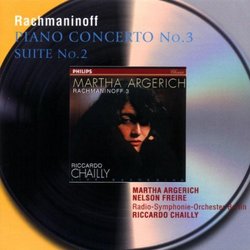 | Riccardo Chailly, Nelson Freire, Radio-Symphonie-Orchester Berlin Rachmaninoff: Piano Concerto No. 3, Op. 30 / Suite No. 2 for two pianos Genre: Classical
If ever there was a high-voltage, wildly passionate performance of Rachmaninov's massive Concerto, this is it. Argerich plays with incredible virtuosity and a spontaneity that almost sounds as if she's improvising the keyb... more » |
Larger Image |
CD DetailsSynopsis
Amazon.com essential recording If ever there was a high-voltage, wildly passionate performance of Rachmaninov's massive Concerto, this is it. Argerich plays with incredible virtuosity and a spontaneity that almost sounds as if she's improvising the keyboard part on the spot. The finale alone would make this a uniquely electrifying performance, but her quicksilver opening movement and soulful intermezzo are on the same extraordinary level. Amazingly, especially for a live performance, Chailly and his orchestra, instead of floundering to catch up, are with her 100 percent. In the Suite, Argerich is joined by longtime stage partner Nelson Freire in a 1982 studio recording made a few months before the Concerto. There's a plethora of excitement here as well, and if the waltz movement pushes close to the speed limit, the Andantino milks exquisite beauties from the work. This is one of those classic discs you'll never get tired of hearing. --Dan Davis Similarly Requested CDs
|
CD ReviewsNot arguably..... simply the greatest I. Martinez-Ybor | Miami, FL USA | 06/28/2001 (5 out of 5 stars) "This beautiful, romantic,finger-killer, arm-breaking of a concerto has had many recordings and several pianists adopted it as a very special calling card during periods of their career: Bolet, Ashkenazy, Horowitz, and most certainly Rachmaninoff himself (well served in his CD reissue). None generate the daredevil excitement, natural abandon, and instinctive musicality of Argerich in this recording (unedited, single-take, live performance). It is wonderful music and rapturous piano playing. The only drawback is that after listening to this, other well-loved performances may pale. This CD belongs in every classical collection...... even violinists'.Having said all that, the original cd issue had a much more rewarding coupling: a masterful performance of Tchaikowsky's First, also from a live performance, conducted by the late Kiril Kondrashin..... an electric partnership, arguably more exciting than Argerich's "studio" recording, good as that one also is. Aren't we lucky to witness her career?" A Rach 3 For The Ages Edward H. Oh | Washington, DC USA | 02/21/2004 (5 out of 5 stars) "Argerich achieves a level of excitement, propulsion, and drama that is astounding to behold. Her performance of Rach 3 is infused with a relentless virtuosity coupled with an inspired artistry. This recording, alone, would have made Argerich a piano legend. I believe the spirit of the Rach 3 allows for two different, yet complementary, approaches to interpretation: one that is poetic, reflective, and reposeful; another that is assertive, unabashedly passionate, and extroverted. The wondrously expansive Van Cliburn live recording from 1958 (made just 2 days after his triumphant return from the Tchaikovsky competition!) is an ideal example of the first approach. The powerhouse performance by Argerich on this disc represents the latter. Of course, both readings contain elements of poetry and bravura, but I'm referring to the overall character of the interpretation. Whereas Cliburn exhibits a refined and restrained romanticism, Argerich bears a naked lustfulness that would make one blush. There is an unmistakable and highly-charged eroticism in the Rach 3 that Argerich brings forth which makes any of the Horowitz versions seem like comparative models of Victorian propriety. The comparison is akin to undressing your lover one button at a time versus tearing the shirt clean off in a fit of unfettered passion. Consider, as one example, the ascending chordal thrusts in the first "mezzo forte" section in the last movement (eight bars after the famous glissando). Argerich turns what usually is a rhythmically labored section for other pianists into an explosion of kinetic excitement. Just hearing this section alone made me want to buy the CD because it revealed a conception of the Rach I never before encountered - a reading of unsurpassed verve and high-wire confidence. This is pianism at its most primal and viscerally compelling.Yes, there are mistakes to be found: a wrong note here and there; a synchronization problem before a third-movement orchestral tutti; a missed cue at the cadenza in the last movement; and some muddled passage work where notes are either blurred or almost inaudible. There are times when one wishes Argerich would give equal prominence to the left hand such as in the electrifying "a tempo come prima" section in - again - the last movement (where Rachmaninov, in a fit of compositional swagger, unleashes a torrent of sixteenth and thirty-second notes over a static and tranquil orchestral support; the image is that of a peaceful ocean deep whose inhabitants are unaware of the hurricane raging on the surface; the way Rachmaninov concludes this audacious section is the musical equivalent of a rapidly spinning top winding down to a sudden stop). Yet, there are voices and textures Argerich highlights to beautiful effect in other places that are all but absent in other recordings. Her relatively small fingers forces her to break some chords in the short cadenza preceding the "Tempo I. Alla breve," in the third movement, but, otherwise, she clutches Rachmaninov's hefty chords by the fistful. Her playing is among the most muscular of any pianist, including Horowitz or Earl Wild. I'll conclude with one comment on a part of the work that is hardly ever referred to, yet is one of the most achingly beautiful in the entire concerto. It is the "Moderato" section that occurs after the first movement cadenza. A further restatement and development of the movement's lyrical second subject, it takes place soon after the point where the piano (playing an accompaniment based on arpeggio figures) and a succession of woodwinds (reminiscing on the movement's first theme) engage in a tender duet. Rachmaninov rewrites the last note of each measure of the second subject restatement a third interval lower, thus creating an extraordinary feeling of emotional denouement. The second subject is the heart of the first movement, and its inspired treatment here represents the culmination of a fantastic musical journey. Yes, the final "Tempo I" recapitulation section restates the first theme, thus closing the circle, and soon brings the movement to its technical conclusion; but, in a profound way, the emotional conclusion occurs in the above "Moderato" section. Martha Argerich brings this section off in the most soul-stirring fashion imaginable. It's better than Cliburn's treatment (although his is fine in its own way), and it exposes the Horowitz versions as stilted and over-mannered. In that moment, Argerich ensured that the most exciting and rapturous Rach 3 was also the most meaningful and touching.Argerich has given us a Rach 3 for the ages." Beware of the hype, and hear other versions... John Grabowski | USA | 02/06/2002 (3 out of 5 stars) "...before deciding this is the "Greatest Rachmaninoff 3rd ever."This is one overhyped CD. Yes, Lady Martha plays like all the blazes, yes, you can almost hear the sonic booms behind her, and yes, she undoubtedly had about eighty espressos before she went out on stage. Yes, the orchestra struggles to keep up with her. Yes, it's electrifying. But the concerto isn't just about being electrifying. The opening theme, for example, is a mournful hymn of longing and nostalgia that in Argerich's hands is simply *fast.* See Spot. See Spot Run. See Spot Run Fast. But there's more to the "Rach 3" than this approach.At the speeds at which she plays her tone tends to range from harsh to not quite so harsh. And her favorite expressive device seems to be rubato, which she can overuse. First movement, after exposition, the main theme comes back, followed by choppy playful piano part; then comes a series of rising variants on the theme, tension building to a great big fortissimo tutti. In those rising variants (sorry, I don't have a score in front of me so I can't give bar numbers) she varies and stretches the rubato almost to the point of pretension, to my ears. But whether it's "pretentious" or not, I've heard other pianists do so much more expressively with this section, altering the coloration of the notes, the pedaling, etc. But at the speed she is playing there's not much she apparently can do besides the push-pull rubato. It's dramatic and exciting the first time, but after repeated listenings it gets a little limiting. (Please note in reference to the reviewer above who said he listened to Rachmaninoff's own recording: I didn't say she does nothing here, just what she does is pretentious and frankly cliched.)This performance is also poorly recorded (not her fault, of course), with a recessed and often muffled orchestra. There are key sections where the brass cannot be heard.All-in-all, this recording actually is worth owning, especially if you're a fan of virtuoso piano playing. But it's hardly the last word in the Rach 3, yet its reputation is such that I fear many people, always looking for (and believing the hype about) "ultimate" recordings, will stop searching after acquiring this one, because after all the sticker on the shrink wrap says it's "The Ultimate Rachmaninoff 3rd," so it is, right? Nope. Worth hearing, definitely. Even worth owning perhaps (despite the warts outlined above, I still keep my copy), but there's still so much in this music that Argerich and company don't bring out. Besides, the Third is too rich a piece for any one version to be called "The Ultimate." Have a listen. There's a lot to enjoy. But beware the hype."
|

 Track Listings (7) - Disc #1
Track Listings (7) - Disc #1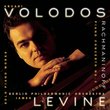
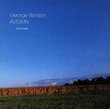
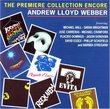

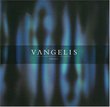
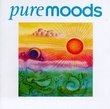
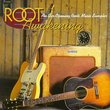

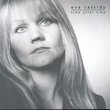
![Frida [Music from the Motion Picture]](https://nationalbookswap.com/cd//m/64/2164/612164.jpg)